The two types of disc-jockey: New Hot Mule LP gives us food for thought
Matthew Stancombe shoots from the hip while musing over Hot Mule’s latest re-issue: Heerlens Percussie Ensemble ‘Biologic Music’
Hot Mule continue to impress on their noble quest to resurrect obscure and note-worthy worldwide sounds. Here they deliver journeys into percussive virtuosity via this re-issue of HPE’s impeccable 1986 release, ‘Biologic Music’. Our favourite digger offers his always entertaining insight.
Written by Matthew Stancombe.
I like to think that there are two broad types of disc-jockey. Of course, they are all human and naturally there is a spectrum into which neither category defines an individual wholly, but for the purposes of this record review, I’m going to say just two types. The “Active” or “Passive” disc-jockey. These titles aren’t meant to demean or suggest superiority, indeed there may be both excellent and terrible examples in each group.
I suggest the Passive disc-jockey is the group who play music that is suggested or fed to them, whatever is deemed cool that week or season, music popular in charts, classics, anthems and popularized, records sitting in the racks on the wall behind the counter at the dance music emporium, easily available and accessible, reissues, compilations, thankfully there is no snobbery here involved in OVO (original vinyl only, first employed by the northern soulies), the top ten underground(?) hits. This may sound derogatory but I insist it is not, they are often consummate professionals, the working DJ who gigs week in, week out, servicing commercial functions, high profile events, guaranteed to rock the crowd, knowing exactly what is required and how to take the roof off. Technically gifted, chosen as tour DJ’s for major acts and able to form a career due to their reliability and consistent performance.
The second group I describe as the Active disc-jockey is comprised of those who are looking actively to fulfil their singular vision. Perhaps looking to create a unique vibe, or sound that isn’t naturally characterized by what’s currently popular, and hence often look (actively) for music that wouldn’t ordinarily be consumed by a nightclub or festival audience looking to dance. And so in their pursuit of their own identity, some records are often re-contextualized by this group, for example, a jazz record being played amidst a selection of techno, or classical recordings being overlaid with electronic percussion. Daniele Baldelli springs to mind, a disc jockey who successfully created his own “cosmic” sound (and now genre) thanks to his outward-looking vision lacking boundaries in pursuit of the groove. Making records work (Actively!), to suit a purpose for which they were not necessarily intended.
I’d like to stress that I don’t think one group is better than the other, both necessary and of course, you’ll be screaming “but the best DJ’s are a combination of both” and you’re probably right. I do however think that it’s more likely thanks to this second group of “Active” disco jockeys that records like the Heerlens Percussie Ensemble enter the arena. Indeed it was the “edit” by Daphni (Dan Snaith/Caribou) on Resista records that introduced me to this particular record, a DJ who I’d happily place into the “Active” disc jockey group, known for taking records from a plethora of other “scenes” like Northern Soul or Ghanaian Funk and Islands Disco and throwing them into the techno/electronic blender to fulfil his nightclub vision.
It’s even more interesting that at the time I heard the record there was a waking up in the West to many records from Japan (in part down to a group of “Active” disc jockeys although also driven by Japanese taste-makers themselves who fed the craze thanks to their foresight and good taste); Fusion, Jazz and Pop, also Ambient and New Age or Fourth World, so I automatically assumed that the -Dutch- Heerlens Percussie Ensemble (clue was in the title, doh!) album Biologic Music was originating from Japan, such are it’s shared sounds and emotions. It fitted neatly in with records by the likes of Mkwaju Ensemble or Yasuaki Shimizu, also records gaining traction in European nightclubs thanks to “Active” disc jockeys like Young Marco, a Dutch DJ who also seemed to be a fan of the Heerlens Percussie Ensemble, including it in his “Liner Notes” compilation for Red Light Radio (and curiously naming his own album “Biology”).
This is obviously a percussive album but also more than drums and bells and whistles and wood instruments (there are saxophone and bass too!), and there are melody and movements. The musicians trained with Steve Reich, Bob Becker, Nippy Noya or Han Bennink (so say the sleeve notes) and I think you can hear the influences easily whereas the skill and training are obviously subtle thus producing an exquisite piece of music. Not, I think, designed for the excesses of the night, though so easily inserted into a DJ mix that you would assume otherwise, happily the record is a delight on the turntable in your living room coming alive in the bright daylight, quite “Biologic”. In fact, the album title fits the sound contained therein so precisely that you can almost hear the album without listening, knowing exactly the pulses and organic sounds likely to be animated by those words. It’s also a sound quite unforgettable and feeling like it has always existed. Conversely, its existence in the wild was rather limited and so Hot Mule are doing us all a favour in procreating and replicating this obscure and intoxicating sound.
Herleens Percussie Ensemble ‘Biologic Music’ is out on Hot Mule April 17. You can pre-order it her
















